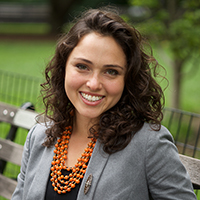Discovering Linguistics: Confessions from a Korean Language Student
Apr 06, 2017
| 139 Hit
Discovering Linguistics: Confessions from a Korean Language Student

By Amarynth Sichel
“Why aren’t you writing in Korean? You’ve been studying so much!” This was my friend’s response, when I told her that someone at Korea.net translates my articles into Korean. Hearing the question, a feeling of helplessness washed over me. Having studied Korean for the past year and a half, I appreciate how different it is from my native English, so I am not surprised that I cannot yet write at a professional level. But how can I explain this to my friend, when I too did not grasp the differences prior to starting my studies?
When I decided to move to Korea, I wanted to set realistic language goals for myself, so I looked up how long it takes a native English speaker to become generally proficient in speaking and reading. To my chagrin, I discovered that the U.S. State Department puts Korean in its ‘most difficult’ category, along with Arabic, Cantonese, Mandarin, and Japanese. The websites I consulted said that Korean is challenging to native English speakers because of grammatical and syntactical differences. At the time, this seemed vaguely implausible: how could grammar or syntax make Korean as difficult to learn as Chinese, with its tones and thousands of characters?
Once I started studying the language, I discovered the differences for myself. To name a few, Korean uses postpositions (조사), rather than English prepositions; has descriptive verbs (형용사), instead of English adjectives; and has many grammatical constructions that lack direct English equivalents. Trying to wrap my brain around entirely new ways of arranging my thoughts, I could practically feel my neurons making new connections. As I contemplated why learning Korean is such a mind-expanding endeavor for me, I found myself wandering away from grammatical explanations, and into the territory of linguistics.
Everyone knows that to speak a foreign language well, it is helpful to think in it. However, the theory of linguistic relativity tells us that the language we speak actually influences how we think. So, if language shapes our thoughts, then learning a new language is also about learning new ways of thinking.
This theory affirmed my experience of studying Korean. Take, for example, the Korean verb and adjective ending, ‘deoragoyo (더라고요)'. This is used to convey a newly discovered fact that the speaker learned through past experience. If I were to say in English, ‘Korea is hot in the summer,’ it would require further context to indicate that I know this because I have been to Korean in summertime. However, in Korean, this meaning could be embedded in the word ‘hot,’ by using the ‘deoragoyo’ ending. Yet because language frames thought—and I still think in English—it often does not occur to me to use the grammar I have studied. Only after providing context the English way do I realize there was a shorter and better way to communicate that thought in Korean.
Language also reflects a cultural mindset, so I confront differences between American and Korean culture in my language studies. As hierarchy is important in Korea, there are a number of different levels of respect and formality coded into the language. For example, when addressing someone who is older, more senior, or not close, a more formal style of speaking is used, which relies on certain words and word endings, called 'jondaemal (존댓말)'; however, when speaking to an equal, someone younger, more junior, or close, a different, more casual, set of words and word endings is used, which called 'banmal (반말)'.
I struggle to navigate the levels of Korean speech comfortably, sometimes with embarrassing results. I accidentally gave commands to a dog using formal speech, which would be sort of like saying, “Sir Spot, please kindly sit;” and I unthinkingly joked with my Korean teacher informally, which though unintentional, was disrespectful. Although I know the rules governing levels of speech, I misspeak because my American English-speaking brain has not yet cultivated an instinct for hierarchical language structures.
I expected studying Korean to help me understand Korean society and culture, and it has. However, I did not anticipate how it would also help me better understand myself and the way I think. Though I’ve studied other languages before, none of my prior endeavors prompted me to notice how my native language provides the framework for my thoughts, or how my Americanness manifests in my use of language. The challenge of learning Korean for me is that of learning new ways of thinking, which is why when my friend asked me why I wasn’t writing in Korean, I just smiled. “Study linguistics—or better yet, Korean—and you’ll see,” I told her.
Amarynth Sichel first came to Korea as a Luce Scholar and worked for the Seoul Metropolitan Government. She now studies Korean Language at Sogang University and freelances as an executive coach.
